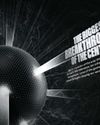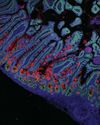
Back in September, researchers at CERN B managed to create and capture a sample of antihydrogen (the antimatter version of hydrogen). They held the sample in a magnetic field so precarious that any slight misalignment would cause it to annihilate against the walls of its container. And then they dropped it.
The ALPHA-g experiment was designed to answer the question of just how 'anti' antimatter really is. Since antimatter was first proposed in the 1920s, we've learned to produce it in experiments and seen evidence for it in high-energy astrophysical environments in space. And we've seen that any contact between a particle of antimatter and its regular-matter counterpart results in annihilation into high-energy radiation.
Despite its violent tendencies, antimatter has generally shown itself to be far less outlandish than its reputation suggests. As far as we can tell, an anti-electron (a positron) is exactly like an electron, except it has the opposite charge (+1 instead of -1), and is opposite in 'parity' (like a mirror reflection).
Like other versions of antimatter, the mass of a positron exactly matches that of its regular-matter counterpart. But until ALPHA-g, physicists had yet to experimentally confirm that antimatter's mass acts the same as that of ordinary matter.
This story is from the New Year 2024 edition of BBC Science Focus.
Start your 7-day Magzter GOLD free trial to access thousands of curated premium stories, and 9,000+ magazines and newspapers.
Already a subscriber ? Sign In
This story is from the New Year 2024 edition of BBC Science Focus.
Start your 7-day Magzter GOLD free trial to access thousands of curated premium stories, and 9,000+ magazines and newspapers.
Already a subscriber? Sign In

THE WORST IDEAS OF THE 21ST CENTURY
NOT ALL IDEAS CAN BE HITS. ALONGSIDE GROUND-BREAKING INNOVATIONS, 21ST-CENTURY SCIENTISTS HAVE HELMED THEIR SHARE OF WILD TECH FLOPS, DUBIOUS THEORIES AND OVERHYPED BREAKTHROUGHS. HERE ARE THE BIGGEST TO FORGET

10 IDEAS THAT WILL SHAPE YOUR NEXT 25 YEARS
Predicting the future is considered a fool's game. But it's one many of us like to play.

THE BIGGEST BREAKTHROUGHS OF THE CENTURY
We're a quarter of the way into the new century. To mark this milestone, we asked the UK's top minds to highlight some of the game-changing scientific breakthroughs shaping our world since the year 2000

DO THE SCIENCE COGNITIVE SHUFFLE
Trouble sleeping? A lot on your mind? Use this trick and sedate your synapses

WHAT DETERMINES HOW MANY ABS I CAN GET?
Assuming you're a human being, you have exactly the same number of abs as everybody else: two.

HOW CAN I IDENTIFY MY PSYCHOLOGICAL BLIND SPOT?
In the 1950s two American psychologists, Joseph Luft and Harrington Ingham, proposed a way of thinking about psychological blind spots - things you don't know about yourself - that they called the 'Johari Window' (the term is a combination of their first names).

How can I change my personality?
Want to become more confident, extroverted or assertive? Science shows that with a few simple changes, you can unlock your best self

Could your cosmetics be harming your health?
Cosmetic companies are phasing out microplastics and so-called 'forever chemicals' to help protect consumers.

extraterrestrial US Congress is talking about activity again. Is the truth really out there?
Despite several testimonies, the question remains frustratingly unanswered

Map of 100 million human body cells revealed
Over three dozen new studies mark significant milestone towards complete Human Cell Atlas